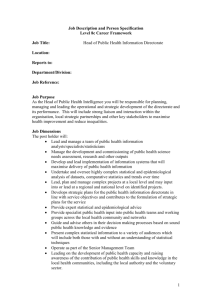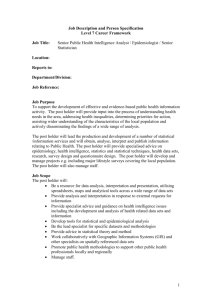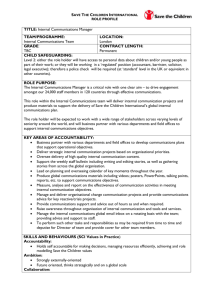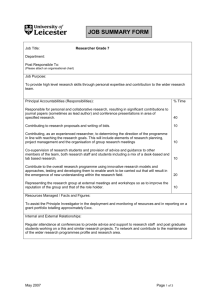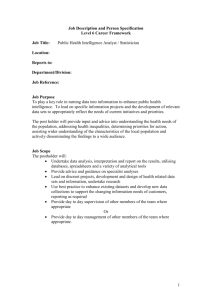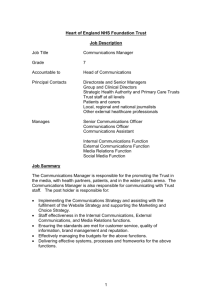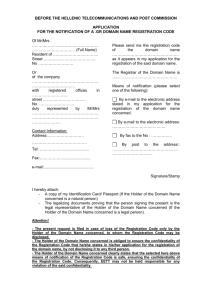Job Description and Person Specification
advertisement
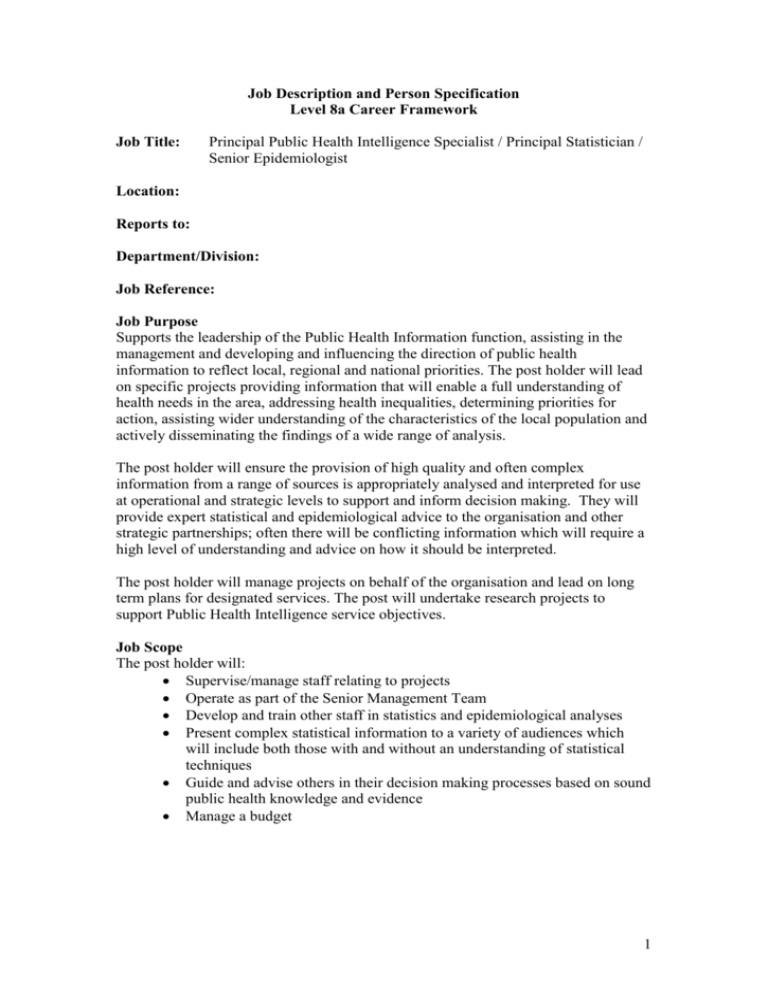
Job Description and Person Specification Level 8a Career Framework Job Title: Principal Public Health Intelligence Specialist / Principal Statistician / Senior Epidemiologist Location: Reports to: Department/Division: Job Reference: Job Purpose Supports the leadership of the Public Health Information function, assisting in the management and developing and influencing the direction of public health information to reflect local, regional and national priorities. The post holder will lead on specific projects providing information that will enable a full understanding of health needs in the area, addressing health inequalities, determining priorities for action, assisting wider understanding of the characteristics of the local population and actively disseminating the findings of a wide range of analysis. The post holder will ensure the provision of high quality and often complex information from a range of sources is appropriately analysed and interpreted for use at operational and strategic levels to support and inform decision making. They will provide expert statistical and epidemiological advice to the organisation and other strategic partnerships; often there will be conflicting information which will require a high level of understanding and advice on how it should be interpreted. The post holder will manage projects on behalf of the organisation and lead on long term plans for designated services. The post will undertake research projects to support Public Health Intelligence service objectives. Job Scope The post holder will: Supervise/manage staff relating to projects Operate as part of the Senior Management Team Develop and train other staff in statistics and epidemiological analyses Present complex statistical information to a variety of audiences which will include both those with and without an understanding of statistical techniques Guide and advise others in their decision making processes based on sound public health knowledge and evidence Manage a budget 1 Organisation Chart Key Result Areas for this post 2 Core Duties and Responsibilities 1. Communication and relationship Excellent communications skills, both oral and written, are required to receive and analyse highly complex statistical information, often in a consulting role resulting in the need to have a high level of persuasive communication skills An ability to present highly complex and sensitive information to other statistical specialists and non-specialist audiences and individuals Presentations will be made to a variety of audiences in both terms of knowledge and size but some may be to large groups of 20 or more Communicate with and establish and maintain relationships with other members of the Public Health Team, a range of other groups or individuals seeking help, advice or information on epidemiology, statistics, statistical methods research, or survey or questionnaire design related to public health Write and contribute to reports. These reports will vary in length and complexity, and will range from informal summaries to detailed comprehensive reports. It will also be necessary for the post holder to be able to summarise these reports and disseminate their findings. Some reports will require complex statistical analyses or contain contradictory findings, and it will be necessary to be able to explain such analyses and finding to specialist and non-specialist audiences in a way that they can understand the implications of the report The post holder will be an expert in public health intelligence; this will involve teaching and training, as well as providing advice Respond when required to press enquiries and general public concerns. 2. Knowledge, Training and Experience Through master’s level qualifications or equivalent qualifications and experience: Demonstrate highly specialist and in depth knowledge of epidemiology, statistics and information analysis related to health that will enable the post holder to provide timely solutions to a range of analytical and methodological issues, projects and queries Have knowledge to design and manage systems to input, store and disseminate public health statistical and epidemiological information. Have appropriate knowledge to be able to support the development and production major reports, e.g. Public Health Annual Report. This requires highly developed interpretation and report writing skills and the ability to explain complex information in simple terms Well grounded experience of undertaking surveys, statistical analyses, and dissemination of findings with the ability to communicate complex information to specialists and non-specialists Knowledge and experience of undertaking evaluations using statistical and epidemiological methods to effectively measure the outcome and benefit of individual public health initiatives Knowledge and experience of developing and delivering training programmes in public health information 3 Detailed knowledge of various statistical software packages as well as database and spreadsheets, and have the knowledge and experience to undertake complex data management and manipulation. 3. Analytical and Judgemental Skills Handle highly complex analytical and statistical health information problems and issues requiring interpretation Use judgemental skills to derive alternative information sources and methods of analysis when appropriate In some cases results may be conflicting, it is necessary to perform sensitivity analyses which involve undertaking numerous different analyses to test and assess various assumptions in order to make judgements about the most appropriate analyses and results in relation to the nature of the situation and the assumptions being made In conjunction with high-level technical skills, a range of complex analytical skills are needed to appropriately identify and respond correctly to complex epidemiological issues Analyses may involve sensitive information so the post-holder needs to ensure that the analyses are completed carefully and correctly. This involves detailed checking and examination of the analyses produced Resolve highly complex queries where there is more than one possible answer and where leading opinion may conflict, and provide expert judgement in deciding the most appropriate solution in the given situation e.g. to support the commissioning process. 4. Planning and Organisational Skills Contribute to the planning and formulation of organisational (local and regional) plans and strategies based on sound statistical and epidemiological information, revisiting current strategies where necessary should the evidencebase change To design and manage systems to input, store and disseminate public health statistical and epidemiological information; setting up systems to integrate and link multiple data sets. Have a number of projects underway at the same time, and it will be necessary for the post holder to plan and organise their own time according to deadlines Exhibit flexibility in order to allow for changes in information format, lack of information provided and delays in receiving requested information It may be necessary for the post holder to arrange meetings with colleagues to plan objectives and work commitments for multidisciplinary research, audits and projects High level project management skills are an essential within this post. 5. Physical Skills The post requires highly developed keyboard skills to input and manipulate data where accuracy and continuous quality assurance is important. 6. Responsibility for patient/client care There will be no clinical contacts, all contacts will be incidental. 4 7. Responsibility for Policy/Service Development Identify gaps in public health information working with multi agency teams to agree and develop appropriate new innovative ways of collecting data and raising awareness of the need and importance of statistics and epidemiology to connect public health information to organisational practice. Lead performance monitoring arrangements to ensure that the Public Health Directorate is able to deliver on the performance targets for which the Directorate has responsibility. Develop and maximise the use of geographical information systems, ensuring that mapped data are available and effectively utilised within the organisation Write and contribute to reports which will be used by others in the development of policies and services to meet the organisation’s priorities, leading on behalf of information and intelligence. Keep abreast of relevant national information developments as part of continuous professional development. Identify, propose and implement changes to working practices to improve the quality of information delivery that will affect other disciplines or parts of the service. Have a high level of understanding of how to work, store and transmit data in accordance with data protection, Caldicott Guardian, freedom of information systems and confidentiality principles. 8. Responsibility for Financial & Physical Resource Option 1 The post holder will be expected to be responsible for the safe use of their own equipment and ensure the computer equipment does not contravene health and safety. Authorised signatory for individual projects. Set and monitor the section/department budget. Hold and manage a delegated budget. Option 2 Take responsibility for managing, setting and controlling a Health Information budget as a budget holder. 9. Responsibility for Human Resources Option 1 Responsible for management of staff in terms of: day-to-day activities, recruitment and selection, performance appraisal and career development etc Provide training and advice to others on data collection, analysis and management Demonstrate activities and work routines to others in data management or data quality Responsible for staff development through 1:1 training and supporting training/continuous professional development sessions within the organisation on an ongoing basis. 5 Supervise students or newer colleagues offering advice and training where required particularly around research, surveys, audits etc. Responsible for work allocation and supervision for junior members of staff. Option 2 Manage a Health Information department or section. 10. Responsibility for Information Resources Lead changes to redesign and develop statistical and epidemiological information systems, new data collection systems and service and policy changes. Develop new data sets where required and set up systems to integrate and link diverse multi-agency data sets and routinely collected health related data sets Adapt, design information systems to meet the specifications of others and to meet the needs of the service Be responsible for the operation of one or more health intelligence information systems for department/service as a major responsibility Be responsible for identified local databases and, if necessary, change the format of the files, merge the databases with other databases, and create a final database which is appropriately labelled and ready for statistical analysis Supervise the further development of the data management and analysis systems. Creating systems and templates to make future analysis easier Support the dissemination of statistics and information to all stakeholders via a number of different media, electronically or written reports Work with colleagues in other public health intelligence networks to share and develop resources, knowledge and skills in order to improve the efficiency, effectiveness and accessibility of information and intelligence. 11. Responsibility for Research and Development Option 1 Provide consulting advice on a range of epidemiological and statistical issues relating to the design, conduct, analysis and dissemination of surveys and research projects Undertake surveys, audits or research to support service development e.g. lifestyle surveys. Option 2 Contribute significantly, when required, to the statistical aspects of articles for submission to peer-reviewed publications Take responsibility for statistical aspects of a research project as a named author as a major job requirement and develop new methodologies for the analysis and/or interpretation of data. 6 12. Freedom to Act Establish, interpret and implement national, professional and organisational policies and procedures, advising where appropriate on behalf of the organisation. Minimum supervision with an ongoing requirement to achieve agreed objectives, with the post holder making decisions on how they may be best achieved, but staying within broad professional or organisational policies Managing work so that deadlines are met and work achieved to the highest standard Frequent use of own initiative and ability to act independently due to the variety of information and analysis required. 13. Physical Effort Combination of sitting, standing and walking Desk based with high levels of concentration but also required to attend meetings throughout the working week. 14. Mental Effort Requires occasional high levels of prolonged concentration on tasks with tight deadlines, for example, conducting statistical analyses, performing transformation and calculations on a variety of large and intricate datasets, performing repetitive data manipulations which involve using many different software packages simultaneously which require focus and concentration for long periods of time There are frequent unpredictable requests by senior staff or stakeholders to respond to immediate requests for support or urgent requests for information. 15. Emotional Effort Occasional exposure to distressing or emotional circumstances in relation to discipline and grievance procedures. There will be a requirement to deal with staff appraisal, staff performance and where required disciplinary issues. May deal with distressing or emotional circumstances in relation to certain data sets e.g. infant mortality. May have to resolve and handle conflict within the team and with other colleagues (internal and external), particularly around deadlines and work specifications. 16. Working Conditions The post is mainly office based, using the computer, collecting, collating, analysing and reporting on data Exposure to unpleasant conditions is rare. This job description is not meant to be exhaustive. It describes the main duties and responsibilities of the post. It may be subject to change in light of developing organisational and service needs and wherever possible change will follow consultation with the post holder. 7 Attributes Essential Criteria Test Desirable Qualifications Highly specialist knowledge and experience of statistical techniques and procedures, acquired through masters level qualification or equivalent experience A ECDL qualification Knowledge and Experience Knowledge of current public health policy A/I Scientific publications, presentation of papers at conferences, seminars etc Fluent in electronically accessing and using complex health related data A/I/T Knowledge and experience of STATA/SPSS/SAS or other specialist statistical software A/I/T Knowledge and experience of GIS systems and outputs A/I Knowledge of the theories of project management A/I/T Extensive working knowledge of MS Office – Excel, Access, Word & PowerPoint A/I An understanding of data security and confidentiality issues A/I Five or more years in a senior analytical role A/I Desirable ranking criteria A A/I Report writing and presentation skills A/I Significant experience of working with multiple sets of health related data and information systems in health related organisations A/I 8 Disposition, Skills and Abilities Experience of system development and query and report writing A/I Experience in the use of statistical and epidemiological methodologies for interpreting and understanding data sets A/I Experience in the development of systems for the inputting, storing and dissemination of information A/I Practical experience in managing and facilitating change Experience in the training and development of others in information skills A/I Experience of dealing with external stakeholders including the Local Authority and shared websites A/I A/I Experience of analysing and interpreting health, healthcare or demographic data or local authority data A/I Ability to develop and deliver complex statistical/epidemiological presentations to large audiences A/I/T Sensible negotiator with practical experience of what can be achieved A/I Conscientious and proven team worker with the ability to engage with people at all levels A/I/T Ability to work independently as well as a member of a team as a self manager with high levels of motivation and a flexible approach to work. A/I/T Highly numerate with skills and experience of the analysis and interpretation of data A/I/T 9 Criteria Test: Excellent written and verbal communication skills, with experience in disseminating information via written reports and presentations to a wide range of audiences in terms of both size and composition A/I/T Experience project based working A/I Organisational Skills, ability to prioritise workloads within timescales and meet deadlines. A/I Budget Management Skills A/I A = Application Form I = Interview T = Test P = Presentation R = References 10
